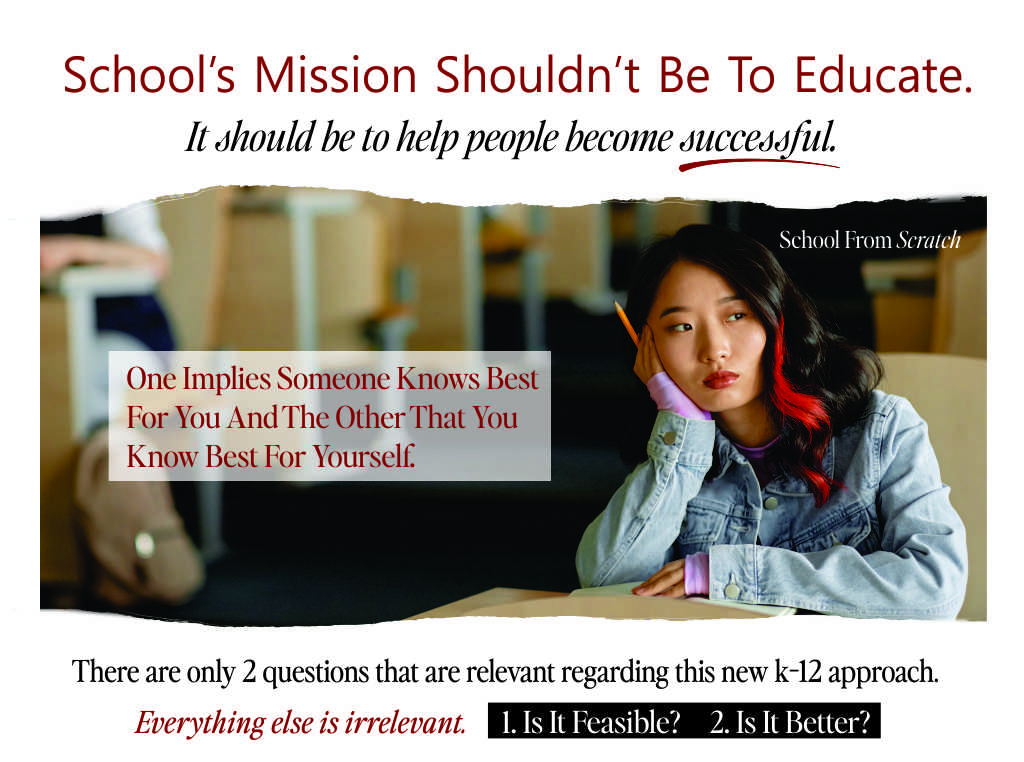|

What is the single most important question about education?Can learning, for the masses, occur at the highest level without coercion or authoritarianism? If yes, then continuing to use force becomes morally indefensible. If no, then defenders must explain why all the vital information people acquire through voluntary means can't be expanded to all areas of learning. What should be the goal of education?School's main objective should be to help people successfully transition into adulthood. More specifically, to help people achieve whatever it is they want to achieve. This creates an unambiguous success metric and eliminates the vague, unmeasurable goals like "well-roundedness" that plague current education. What are people's actual life priorities?In real life, our three biggest concerns are health, money, and relationships. School should mirror real life by focusing on these universal human priorities rather than forcing abstract subjects that have no practical value for most people. What's the best proof that voluntary learning works?After-school activities. They are voluntary, well-attended, and people say they get a lot out of them. These activities cover essentially everything studied in regular classes, but students engage willingly. The same kids who are disengaged in mandatory classes often become passionate in voluntary activities covering identical subject matter. How much does the current system actually cost?Roughly $200,000 per student over K-12. Imagine if every year parents had to write a $15,000 check for their child's education. Would they see the value? We use return-on-investment thinking for college - why not apply the same practical analysis to K-12? What makes the current system like a prison?Both schools and prisons are highly authoritarian institutions where participants must get permission for almost every move and failure to comply is met with negative consequences. This makes people unnecessarily equate education with pain and teaches compliance rather than independent thinking. What would a better system look like?Make school less like a prison and more like a library - a voluntary resource center where people go to get help achieving their goals. Staff become helpers rather than enforcers, students become participants rather than captives, and the entire institution shifts from control to service. What about people who won't participate voluntarily?If you believe an overwhelming majority would use a voluntary system, then you have no argument against making school optional. If you believe people wouldn't attend voluntarily, then you're admitting the current system provides no real value and needs complete overhaul. There's no third option. Won't people just stay home and play video games?Even if school becomes completely optional, life is not. People still need skills to become self-sufficient. After high school, government mandates for learning end, yet most people continue developing skills throughout their lives because life creates natural incentives that are far more powerful than artificial ones. What about being "well-rounded"?How many people do you know complaining about not being well-rounded enough or not understanding geometry and biology? The answer is zero. We're trying to convince ourselves that being well-rounded (which no one can define) is something people strive for, when in reality almost no one cares about information that's essentially trivia. What is "garbage" in education?Garbage is work or procedures that have no obvious productive value. Homework becomes busy work when forced on uninterested people. Testing measures compliance rather than capability. Mandatory attendance ignores whether learning is actually occurring. We have finite energy - wasting it on garbage can be the difference between success and failure. How does this help school staff?It solves their biggest problem by aligning what the community wants with what the school offers. Staff are no longer forced to enforce outcomes many find unacceptable or defend a system widely seen as ineffective. Instead, they can redirect their skills toward being helpers committed to efficiently aiding individuals in achieving their dreams. What about implementation costs?None. This requires no changes to funding, infrastructure, or personnel. It's pure organizational redesign using the same resources, same people, same buildings - just shifting from coercion to service. Everything being proposed is already proven in real life through libraries, gyms, community centers, and voluntary learning programs. Why is this such a big idea?Because it changes society from the bottom up, making it incredibly durable since it reflects the genuine will of the people. People raised in voluntary, service-oriented environments would naturally expect institutions to serve rather than control them. This would fundamentally reshape how society organizes itself around human agency rather than compliance. What's the ultimate vision?An entirely different society where micromanagement becomes obsolete because people naturally take responsibility, where institutions compete to serve rather than control, and where the artificial stress and conflict created by authoritarian systems is eliminated. All achieved simply by aligning education with how humans actually learn and thrive.
An interesting metaphor about school and life
|